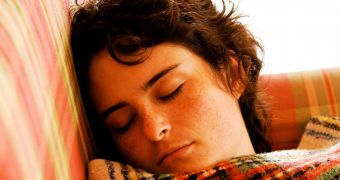According to a new set of investigations, it would appear that people who have a variant of certain genes expressed more than in the general population tend to sleep more than individuals in which this gene is less strongly expressed.
In other words, it would appear that indeed some people are hard-wired to sleep more than others. The trait is controlled genetically, which means that there is little individuals can do to change it.
The new results are derived from an investigation that covered about 4,200 European test subjects. Each of the participants had his or her DNA material scanned, as researchers were looking for any possible associations between longer sleep durations and genetic make-up.
Each of the people in the study were also questioned about their average nightly sleep durations. The investigation led scientists to conclude that a version of the gene called SUR2 was responsible for the differences.
The science group determined that people who expressed this variant tended to sleep on average for about 28 minutes longer than their peers who had another version of the gene.
Details of the research were made public on November 5, at the annual meeting of the American Society of Human Genetics. University of Munich researcher Karla Allebrandt presented the findings.
The team was not content with simply discovering the genetic variant. It also took it upon itself to study if SUR2 variants actually influence the amount of time a person sleeps, or if the genes was found by accident, and is unrelated to sleeping patterns.
As such, the group began studying the influence that SUR2 had on fruit flies, insects that are oftentimes used for such investigations. One of the two groups analyzed was modified to not express SUR2.
The study group slept less during the study period, the team reports, whereas the control group, whose genetic makeup had not been altered, slept more on average.
Allebrandt says that partially responsible for this is the fact that SUR2 encodes a very important protein. The molecule is a part of the transport channel, that is reponsible for moving the critical element potassium in and out of cells.
This investigation comes one year after another research team determined that a rare variations in the DEC 2 was associated with two less hours of sleep per night in the people who had it, Science News reports.
This gene plays an important role in regulating the circadian rhythm in the human body, explained at the time the researchers who made the finding, who were based at the University of California in San Francisco (UCSF).

 14 DAY TRIAL //
14 DAY TRIAL //